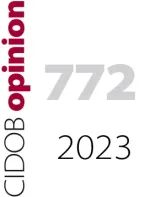China emerges in the Middle East

China’s role in the Gulf is increasing and it was only a matter of time before Beijing’s interests would head towards a more active diplomatic role. The growing economic leverage of China in the region has given its patient diplomacy clout to sponsor a reconciliation agreement between two major rivals, Saudi Arabia and Iran. At the same time, the US is hampered by its relative disengagement from the Middle East and the fact that it has no access to Tehran.
As in Europe, as in Africa and the broader world, so in the Middle East. It was only a matter of time before China’s huge economic interests in the Gulf pushed it towards a more active diplomatic role, as it happened when it sponsored a reconciliation agreement between Saudi Arabia and Iran, two major rivals in the Gulf. The West worries about China’s growing economic, trade and military footprint. The EU seems at a loss to define a coherent policy towards the lands of the Middle Empire, with many of its members (France, Germany, Italy and Spain to quote but a few important ones) reluctant to fall into the trap of what they see as the growing trade hostility displayed by the US towards China, which was initiated by the Trump presidency but has been pursued under the Biden administration.
Hard economic and geographical facts explain why China’s role in the Gulf is increasing. China is the world’s largest importer of oil and the main purchaser of Iranian and Saudi crude. China is the main trading partner of both countries and has invested heavily in infrastructure projects as it has in Africa and Europe, let alone across Asia.
For Iran, faced with a relentless hostile US since the 1979 Revolution, China is an attractive partner as Western sanctions have cut it off from many countries in the West who were its historic trading and investment associates. For Saudi Arabia with its ambitious Vision 2030 goals, China is a partner of choice, especially as the kingdom is no longer prepared to sing from the same hymn book as the US. Saudi Arabia is following in the footsteps of Turkey, most famously, but also of South Africa, Algeria and Brazil.
The growing economic leverage of China in the region gives its diplomacy clout even if it is up to Iran and Saudi Arabia to decide how much flesh they want to put on the bones of this reconciliation and for how long. The 1993 Oslo Agreements and the 2015 Iran nuclear deal offer a warning of how difficult it is to make major agreements stick in the Middle East. But China plays a long, discrete diplomatic game, unaffected by the pressures of domestic politics. The French historian invented the expression “le temps long” which can aptly be used to describe Beijing’s game, in the Gulf as elsewhere in the world. China’s role in brokering the reconciliation followed in the footsteps of earlier efforts to deescalate tension between Iran and Saudi Arabia brokered by Oman and Iraq. Many states in the region would welcome a cold peace – jaw jaw is better than war war.
The US is hampered by its relative disengagement from the Middle East in recent years and the fact that it has no access to Iran. Having signed strategic partnerships with Iran and Saudi Arabia in 2021 and 2022, Beijing’s patient diplomacy is being rewarded and all points to China’s security involvement in the Gulf being beneficial for regional security too – a point which no one in the EU will dispute.
What does this episode tell us about Saudi foreign policy? As one former Saudi foreign minister pointed out, his country did not have a Catholic marriage with the US but a Muslim one in which more than one wife was allowed. Saudi Arabia will not divorce the US, simply have multiple marriages.
What are the implications for US foreign policy? America is learning the hard way that to re-prioritise its policy in favour of the Pacific region has opened up opportunities for Russia and China in the Middle East. Russia seized its military chance in Libya, Syria and now the Sahel, hugely complicating Western policy across a vast area of Africa. The West seems to have sleepwalked into a nightmare. In the Gulf, the US will remain the region’s most important security partner but where economic affairs are concerned, we are in an ever more multipolar world. The Saudi decision is strategic not tactical. The West, especially the US, France and the UK seem to favour tactical decisions (Libya being a good example in 2011) over strategic thinking.
China is, for the time being playing a weak Middle East card deftly but as it develops and deepens its links with the Gulf, it might find itself playing a zero-sum game with the US. A growing role for China will undercut US efforts to isolate Tehran which is at the same time repressing its people harshly and helping Russia in its war against Ukraine.
China argues that its diplomatic role in the Middle East contrasts with what it describes as the US aggressive and militarised approach. The Middle East is an important cog in the Belt and Road Initiative along which multiple energy, trade and transport links are knitted. The litmus test of Chinese influence could well be whether it can convince Iran to freeze its nuclear program. These are early days but, as Philip Snow’s masterly account of four centuries of China-Russian relations demonstrates, it is foolhardy to underestimate the determination and sophistication of a country – an empire should I say, whose history stretches back thousands of years.
Keywords: China, Middle East, Gulf, Saudi Arabia, Iran, US, EU, West, security, patient diplomacy, Vision 2030
All the publications express the opinions of their individual authors and do not necessarily reflect the views of CIDOB as an institution.